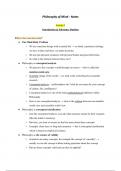Samenvatting
Summary - Philosophy of Mind Part 1 (500251-B-5)
- Instelling
- Tilburg University (UVT)
A summary of Part 1 of the course Philosophy of Mind. Includes lecture notes and images. I got an 8 with these notes. Good luck studying! :)
[Meer zien]




